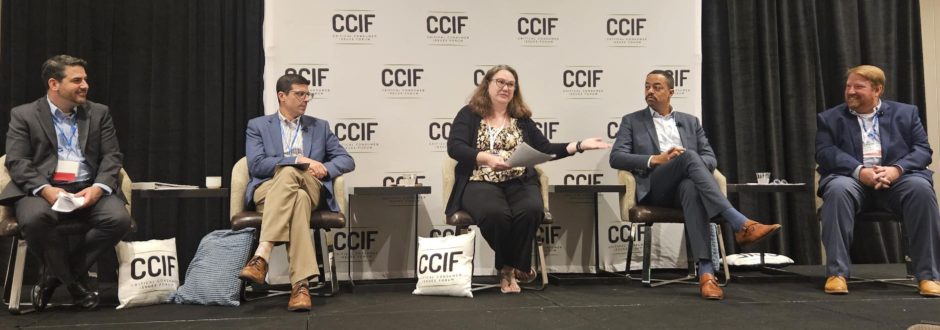Download CCIF’s Grid Modernization Issues with a Focus on Consumers Report. |
Background
While CCIF will address other important consumer issues in the future, CCIF leadership selected those residential consumer-centric issues associated with grid modernization as the first area for CCIF concentration. Given the number of current public and private sector initiatives aimed at addressing grid modernization issues, CCIF committee members felt this topic was both extremely ripe and important for debate among the groups.
Without question, state commissioners, consumer advocates, and investor-owned electric utilities have both individual and collective perspectives that should be considered as policies are formed regarding grid modernization development, deployment, and consumer protection. This report shares a slice of their collective perspective on some of these critical consumer issues. In addition, it demonstrates that these groups are clearly able and ready to lead the state and national debates on tough consumer issues – those pertaining to grid modernization and countless others.
Terminology: Grid Modernization versus Smart Grid
While recognizing broad acceptance and use of the term “smart grid,” CCIF participants ultimately decided that the term “grid modernization” better captured the scope of their dialogue and the principles that flowed from it. The term “smart grid” is often used interchangeably with the term “smart meters,” and participants hoped to avoid perpetuating the confusion resulting from that and other misuse of terminology.
Report on Grid Modernization Issues
On September 13, 2011, CCIF issued its report, “Grid Modernization Issues with a Focus on Consumers,” which outlines broad principles for addressing the consumer impact of modernizing the nation’s electrical grid. Specifically, it identifies 30 principles for enabling increased investment in cost-effective grid modernization efforts, while protecting consumer interests. Seventy-four esteemed participants from the state commissioner, consumer advocate, and electric utility communities developed the consensus-based principles through a series of interactive dialogues held across the country.
The issue areas and the broad focus of the principles are listed below:
- Consideration of Grid Modernization Investments—The benefits, costs, and risks of modernizing the grid to consumers and society as a whole should be thoroughly analyzed.
- Consumer Protections—Consumers should be provided timely delivery of energy usage and price data, and appropriate consumer safeguards should be retained or enhanced, particularly with respect to low-income or at-risk customers, new variable rate and service programs, remote disconnections, and pre-paid services.
- Privacy & Security—Energy information access and disclosure requirements as appropriate for consumers, utilities and their contractors, and other third parties should be addressed.
- Consumer Education & Communication—Consumers should receive accurate and complete communication of the benefits, as well as the costs and risks, of grid modernization.
- Federal-State Relations—While collaboration can be beneficial, states must retain their full regulatory authority over retail pricing and customer service matters, and federal initiatives should be informed by, but not pre-empt, state regulatory processes.
